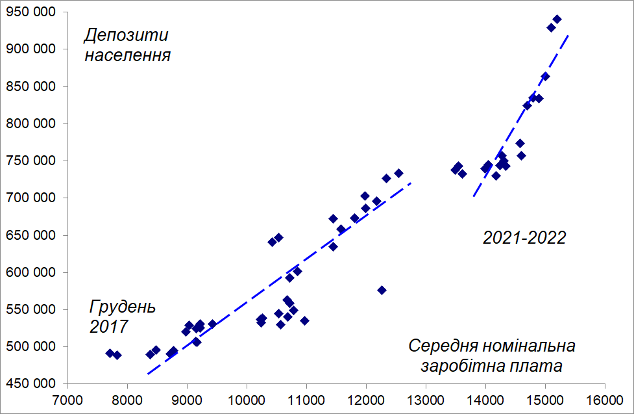With the beginning of the Russian aggression, Ukraine faced a sharp decrease in employment and an increase in both official and actual unemployment — according to various estimates, 30–40% of workers lost their jobs. As a result, salaries, being the main source of income for most households, also fell significantly.
Moreover, we should not expect a noticeable increase in salaries in the near future. A number of production factors — growth in energy and logistic costs, poor marketing possibilities, including exports — reduces the resources of enterprises, which (under other conditions) could be used to raise wages.
According to our observations, today the average official salaries are practically "frozen" at the level of January-February, which, in the absence of the "usual" bonuses, surcharges and extra payments of the previous years, actually means only stabilisation of nominal hryvnia payments. This is indirectly confirmed by the National Bank of Ukraine, taking into account the stabilisation of the budget receipts of the paid SST. However, given the high inflation rate (since the beginning of the year, the Consumer Price Index has risen by almost 20%), we have a significant decrease in real wages, and with it, real incomes of households.
A decrease in the resources and opportunities of enterprises to raise wages means not only the loss of household welfare. Opportunities for savings, being an important macroeconomic component (forming a potential investment resource), are decreasing, too.
However, we should talk about household savings as unused opportunities to support macroeconomic stability, due to the fact that since the beginning of the Russian aggression, funds on household deposits have grown rapidly (in the summer months the growth even accelerated, table "Household deposits..."). At the same time, demand deposits ensured the general growth of deposits, and the share of demand deposits with a term of up to one year for the specified period even increased by almost 2 percentage points and exceeded 87% of the total.
Household deposits in 2022, UAH billion
|
|
Jan |
Aug |
|
Total: |
773.8 |
940.3 |
|
In that: |
|
|
|
on demand |
452.5 |
641.3 |
|
Up to 1 year |
207.8 |
177.6 |
|
1 year and more |
113.5 |
121.4 |
|
Share of demand deposits and deposits for up to 1 year, % |
85.3 |
87.1 |
The main factor of this increase in deposit resources was, of course, presented by payments to the military, which (unlike in previous years) were made on time and in full, thanks to the financial support of partner countries to Ukraine. Of course, this priority of public expenditures should be welcomed, since the needs of security and defence, including providing the defenders of Ukraine with all they need, is really an urgent matter.
It should be noted that the mentioned significant increase in payments to the military cannot yet substantially affect the average wages in the country, because the supply of labour is recovering at a much higher rate than enterprises’ needs, and the "conservation" of wages continues. That is, the total resources of households are growing at a significantly higher rate than the ability of the economy to provide them (households) with domestic goods and services, which is reflected in salaries (diagram "Average salary and deposits of households")
Average salary (UAH/month, horizontal axis) and household deposits (UAH billion, vertical axis), 2017–2022 (monthly)
Household deposits

December 2017, Average nominal wages
Meanwhile, the rapid growth of funds on household deposits (most of which are demand deposits, that is, they can be used at any time) may bring certain macroeconomic imbalances.
First of all, the availability of funds in households, under weak economic dynamics, acts as a significant factor of inflation. Secondly, since the population traditionally considers cash dollars as a reliable resource for long-term savings, in the conditions of current risks associated with a possible military escalation, the purchase of cash currency will continue, which will naturally put pressure on the exchange rate, and thus require foreign exchange interventions with the associated loss of the country's currency reserves.
So, on the one hand, there can be no doubt that significant payments to the military (who, protecting the country, risk their lives every day) should continue. On the other hand, there is a need to neutralise the deposit "surplus", i.e. purposeful use (of a non-inflationary and non-devaluation nature) of the population's deposit resources.
Military governmental bonds, primarily in hryvnias, can and should be used as such an alternative instrument. So far, the volume of hryvnia governmental bonds of households is extremely low, especially compared to the even increased deposits. Hryvnia deposits of households amount to UAH 580 billion (out of the total UAH 940 billion). At the same time, the volume of hryvnia military bonds held by domestic businesses and citizens is only UAH 14.1 billion (less than 16% of the total volume of purchased military governmental bonds denominated in hryvnias). As a conclusion, it is expedient to pursue a more active and clearer policy of attracting Ukrainian citizens to the market of military governmental bonds in hryvnias. This, in addition to reducing the risks, will expand the possibilities of financing the budget deficit from internal sources.
https://razumkov.org.ua/komentari/pro-resursy-domogospodarstv




